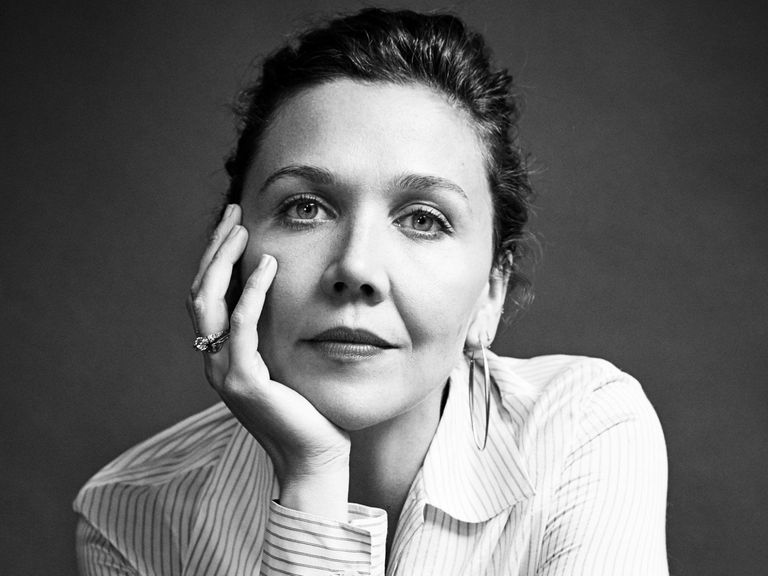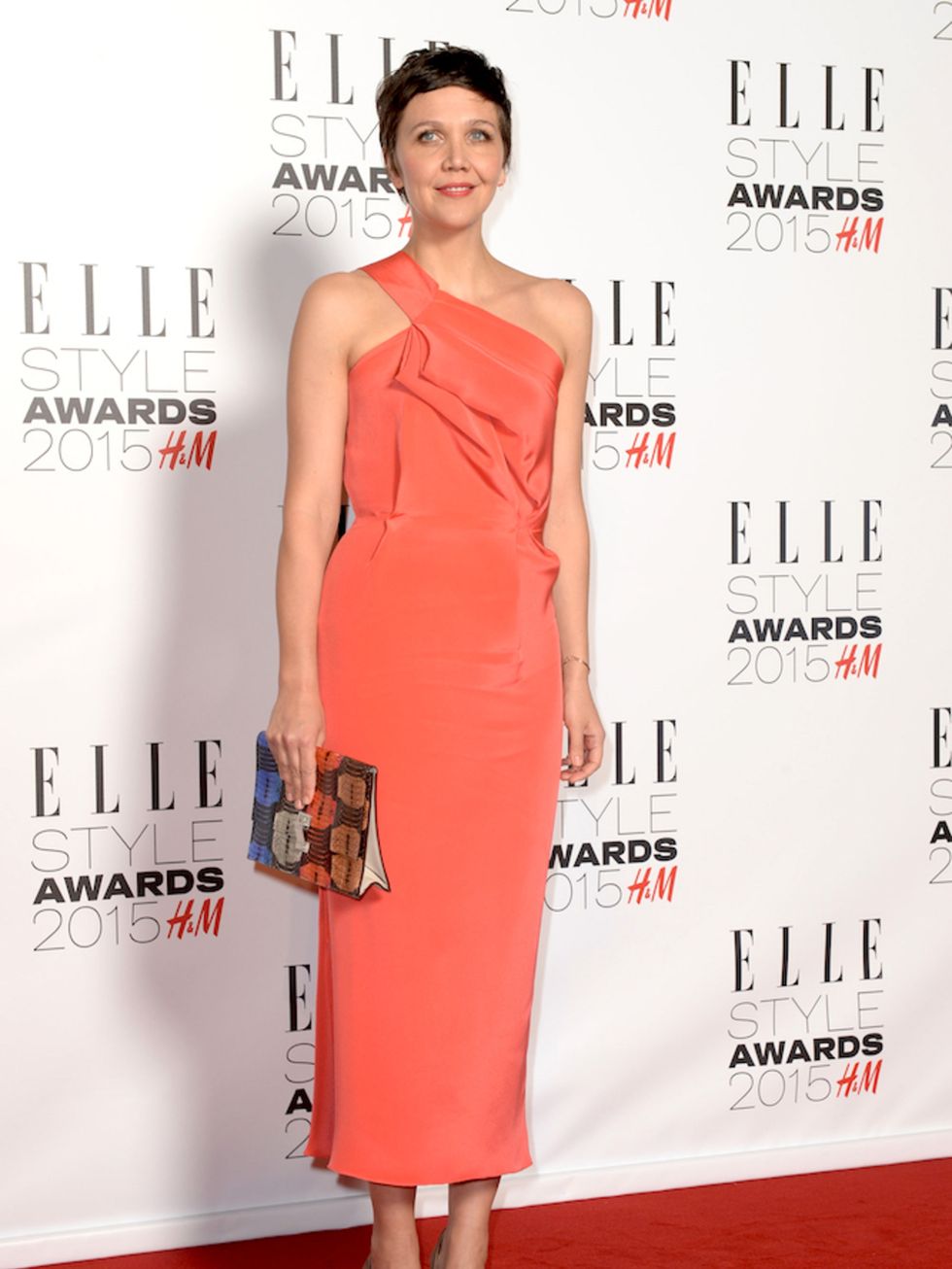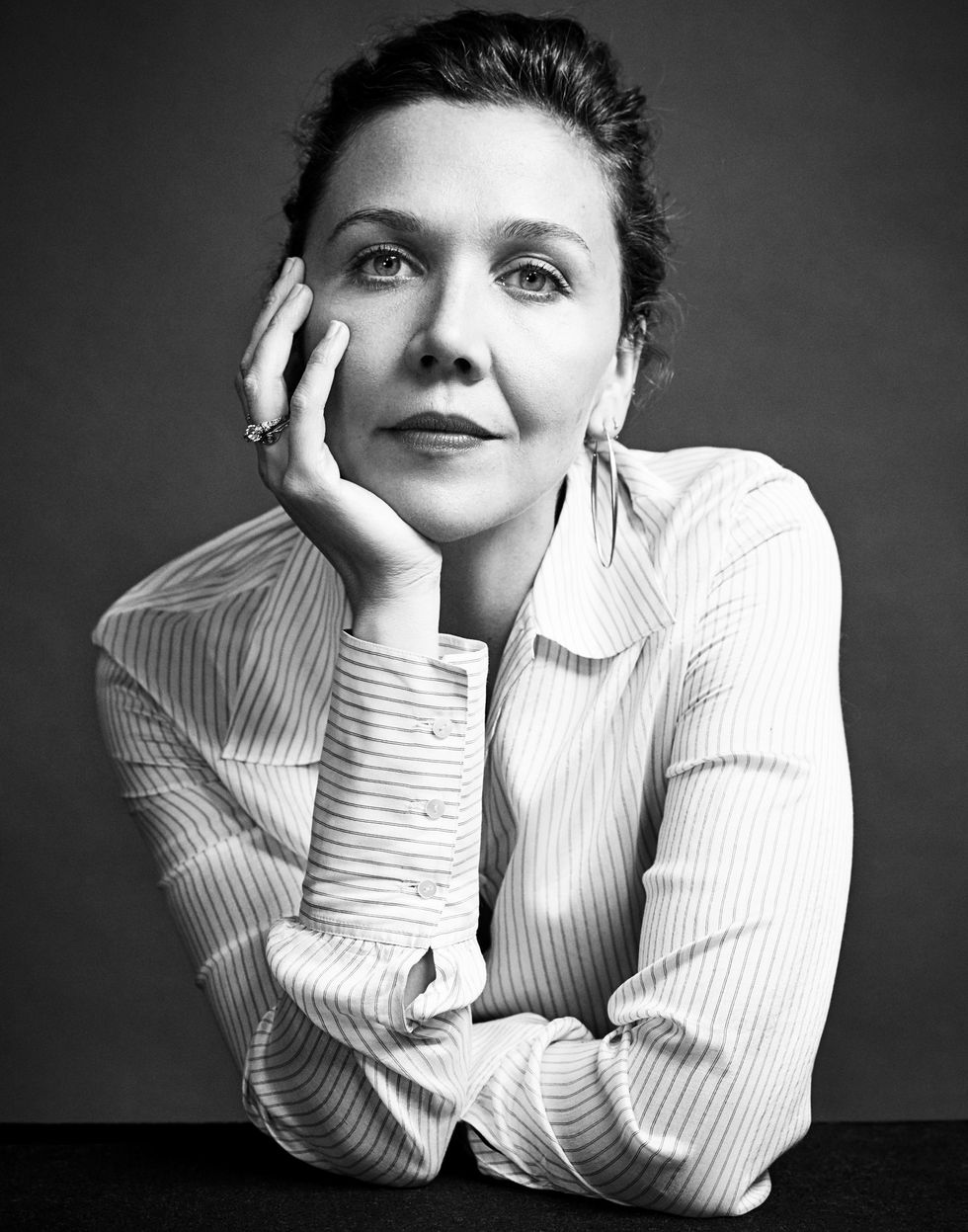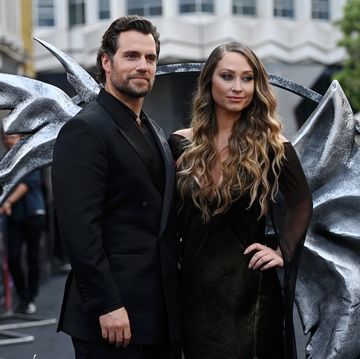Not long ago, Maggie Gyllenhaal's five-year-old daughter Gloria asked her what a witch was. It was right after the US election in late 2016. She considered her answer carefully. 'I said, "A witch is a powerful woman that nobody can handle. And they had to marginalise them because of that." I'm trying to make my husband laugh, but on the other hand I think that's true,' she says jokingly. The Brooklyn-based actor, 40, also applies this kind of knowing cynicism to her professional life. She is in the business of female representation, not only as a mother and activist, but as an actor and now producer, too.
Her next film, a thriller called The Kindergarten Teacher, is a project developed almost entirely by women, with Maggie acting in almost every scene, as well as in the producer role. 'It wasn't an exercise in women making movies together, it just happened that we were a group of women,' she tells me over the inevitable kale salad in Manhattan's ABC Kitchen. 'Our sensibility was feminine, so what we were going to make when we put it all together was going to be different than if it were made by a group of men. I'm curious to see what that's going to look like.'
Another project, another intriguing female character. No doubt by now you're addicted to The Deuce, from the creative team behind The Wire (David Simon and George Pelecanos), in which Maggie co-stars in an ensemble cast alongside James Franco.
Set around the gritty Times Square area of New York City in the early Seventies, it follows the intersecting lives of the pushers, pimps, police and prostitutes who populate the neighbourhood. Maggie's character, Candy, is a sex worker, who's neither the stereotypical hooker with a heart of gold nor a sad-sack addict. Who said that interesting roles for women have to dwindle after the age of 30?
'These are all characters that you could only play if you're over 35,' Maggie admits. 'There are very few things out there, and especially when we were young, that really represent our experience as women. What we've gotten used to doing is we take what we can get and we turn it into what we need it to be.'
For her role in The Deuce, she read the first three scripts — the writing was 'unusually excellent' — and was pulled towards the character. But she also had some hesitations about portraying a sex worker. 'There was a little part of me that was concerned that they weren't interested in telling the same story as I was interested in telling. That's why I asked to become a producer because I wanted to have some guarantee that I would be included in the storytelling process.'
She was so involved, she says, 'The joke on set was "Maggie, what kept you up last night?" There was always one thing that I would write a long email about at night. I would say, "Here are the tiny things. If you don't do these, fine, but you must do this."
One such thing she felt strongly about was to show her character masturbating or having sex off the clock. 'I thought that would be, in some ways, an opening into her needs, her desire, her agency,' she says. 'I didn't hear anything about it for a long time. David Simon sort of joked with me, like,"'What? Really?"' But he delivered a script with a story line about Candy's own love life, and even includes her masturbating and having an orgasm that's both vulnerable and profound. It shouldn't, but somehow it feels radical to watch a woman whose job is a sex worker focusing on her own pleasure.
Beyond the pitch-perfect Seventies costumes and street scenes, what makes The Deuce immersive is how different it was to access sex and porn in that era. Forget PornHub. Prostitutes had to walk the streets rather than setting up discreet websites; watching pornography was a group experience in a seedy theatre.
Compare that with now. 'Who needs a union more than a prostitute?' Maggie asks of sex workers today. 'I'm quoting David Simon actually, and I agree with him. My instinct is to say decriminalize it and make sure everybody's safe, healthy and taken care of.' In her research, she found that many former sex workers go into nursing. 'They're so comfortable with bodies, and bodily fluids,' she says with a wry laugh.
Maggie has always been vocal about her politics – in 2003 she spoke out against the Iraq war, she is a big supporter for Planned Parenthood, has campaigned for the American Civil Liberties Union (ACLU), and is resolutely anti-Trump. 'I feel pretty informed these days. Like most people, I'm kind of obsessed by the political climate in a way that I never really was before.' However, she admits that, sometimes, even that doesn't feel like enough. 'I just had a friend staying with us whose job is being an activist. We're all going to marches and retweeting, and she's an activist. I have a lot of respect for that.'
Acting, of course, is a family affair. She's the wife of acclaimed actor Peter Sarsgaard (they've been together since 2002 and married in 2009), daughter of film-makers and sister of fellow actor Jake Gyllenhaal. So one might think it's all office chat at home. 'I like to talk to Peter about his parts, but he doesn't really like to talk about mine,' she says. 'He wants to keep it out of our family life; I'm much more interested. I want to hear about it every night. How was the play? What happened? Who did what? But at a certain point, you just have to go: "You know what? That's cool, I'll talk about it somewhere else."'
They've been together an eternity in Hollywood time. Then again, they live in Brooklyn, far from Los Angeles, so maybe that's one secret. 'We really are in love. We're crazy about each other. Every couple has stuff they have to work through, which of course we have, but we love each other really hardcore,' she says.
Beyond this disclosure, Maggie is pretty guarded about the personal stuff, though it's obvious from her acting choices that she's as intrigued as the rest of us about what goes on behind closed doors. This theme emerges again and again in her work. 'Part of the reason I'm interested in sexual interactions is because they are so private, and they're the ones that you usually don't get to show other people.'
Case in point: 2002's Secretary, about an underling having a sadomasochistic affair with her boss (James Spader), which made Maggie's name, in some small part because the edgy role featured a great deal of nudity. She was 25 when she filmed it; a wholly positive experience that spoiled her. 'It was so much about self-expression and an interest in what I had to express as an artist. It was so special and unusual, but I thought that's what every experience was going to be like,' she says, laughing at her naïveté.
'I had some horrible things said to me when I was young. I remember a director saying that she didn't like my eyes, the way that they go down, so when we went to reshoot a scene, I had to wear a towel twisted on my head, the way you do when you get out of the shower, because maybe it would pull my eyes back. That's not the exception to the rule. I pretended, even to myself, that I could handle it, but of course those things hurt.'
Thankfully, the wardrobe conversations have become more fun since then. When she was making The Honourable Woman for the BBC, she says, 'We went to Harvey Nichols and looked at the Céline section and we were like, "Oh my God, this is it. We just need all Céline." Then we asked them if they'd lend us some, and they wouldn't. So we went to the costume house, got a big man's jacket and sewed pearl buttons on it. We were like, ta-da "Céline",' she jokes.
Today, dressed in loose cotton trousers and a terracotta top, Maggie looks like a true Brooklyn resident; her next stop could be the farmers' market, but instead it's JFK airport for a transatlantic flight. 'I flew in this morning and I'm leaving tonight,' she says, and smiles, as she tends to do in the face of chaos. That hint of knowing cynicism never far off.
This article originally appeared in the December issue of ELLE UK















